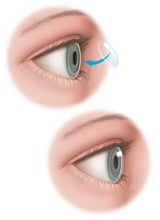
The cornea is the clear, dome-shaped layer that forms the front of your eye. Its function is to focus light into your eye. Diseases of the cornea can decrease vision and cause eye pain. The corneal specialists at the Virginia Eye Institute, Dr. Christopher Estopinal and Dr. Mackenzie Higgins, evaluate and treat diseases of the cornea, including dystrophies, infections, corneal swelling, keratoconus, trauma, and dry eyes.
Corneal Transplantation
Both Dr. Estopinal and Dr. Higgins are experts in corneal transplantation, including penetrating keratoplasty and endothelial (partial thickness) keratoplasty. Most often used to restore vision in patients with a damaged cornea, cornea transplants are performed more than any other transplant operation in the nation. As experts in advanced surgical methods, the microsurgeons at Virginia Eye Institute perform this outpatient operation with tremendous precision and success.
Penetrating keratoplasty, or full-thickness corneal transplantation, replaces all layers of the cornea, and thus is able to correct vision from a variety of corneal diseases. Endothelial keratoplasty, such as DSAEK (Descement’s stripping automated endothelial keratoplasty) and DMEK (Descemet’s membrane endothelial keratoplasty) are able to selectively replace specific diseased layers of the cornea, allowing for faster recovery, clearer vision, and fewer postoperative issues.
Keratoconus
Keratoconus occurs when the cornea thins and bulges outward, like a cone. The change of shape in the cornea brings light rays out of focus. As a result, your vision becomes blurry. The corneal specialists at the Virginia Eye Institute are able to treat keratoconus in a number of different ways, including:
- Custom fit contact lens: Several types of contact lenses can correct vision problems caused by keratoconus, including soft lenses, rigid gas permeable lenses, and scleral lenses.
- Collagen cross-linking: Your ophthalmologist uses a special ultraviolet light and eye drops to strengthen the cornea. Doing this helps to flatten or stiffen your cornea, keeping it from becoming more misshapen.
- Corneal transplant: When symptoms are severe, your ophthalmologist may suggest a corneal transplant. Your ophthalmologist replaces all or part of your diseased cornea with healthy donor cornea tissue.
“I met with Dr. Estopinal at Virginia Eye Institute for the first time about 2 years ago (in 2019) after my last corneal specialist retired. While I had been trying to keep up with the latest treatments for Keratoconus (“KC”), it was clear that my last doctor had long ago stopped keeping current with medical advances. At my first meeting with Dr. Estopinal, it was beyond clear that not only was he up to speed with all of the treatments available for KC, his practice also has some of the most cutting edge technology to map and track corneal degeneration progression. Dr. Estopinal is very patient and has taken the time to answer all of my questions. He has also been diligent in evaluating my eyes and in determining if there has been any degenerative progression since I have been a patient. I have been very happy to have found a corneal specialist that I can rely on and trust. And since my KC is not going away, I hope to be a patient of his for a long time.” – Jim N.
What is Corneal Collagen Cross-Linking?
Corneal collagen cross-linking is an outpatient procedure that halts the progression of keratoconus. Riboflavin drops are applied to and absorbed by the cornea, and ultraviolet light treatment is then applied to the eye, causing a reaction within the corneal stroma to create bonds called cross-links. Those bonds stiffen and strengthen the cornea stopping thinning, weakening and distorting.
Corneal Infections
Dr. Estopinal and Dr. Higgins treat frequently treat infections of the cornea, including bacterial, viral, and fungal infections. These types of infections often occur in patients with predisposing conditions including contact lens wear, ocular surface disease, or trauma. Both are investigators in the Zoster Eye Disease Study (ZEDS), an international, multi-center trial investigating therapy for zoster (shingles) related eye disease.
Dry Eye
Dry eye disease, or ocular surface disease, can range from a condition causing mild eye irritation to sight-threatening dryness of the eye. Our corneal specialists are experts in providing care to patients with all stages of ocular surface disease, and have a variety of medications and devices available to improve the comfort and health of your eyes.
In addition, Dr. Estopinal & Dr. Higgins diagnose, treat, and manage many different eye diseases and conditions, including, but not limited to, the list provided above.




